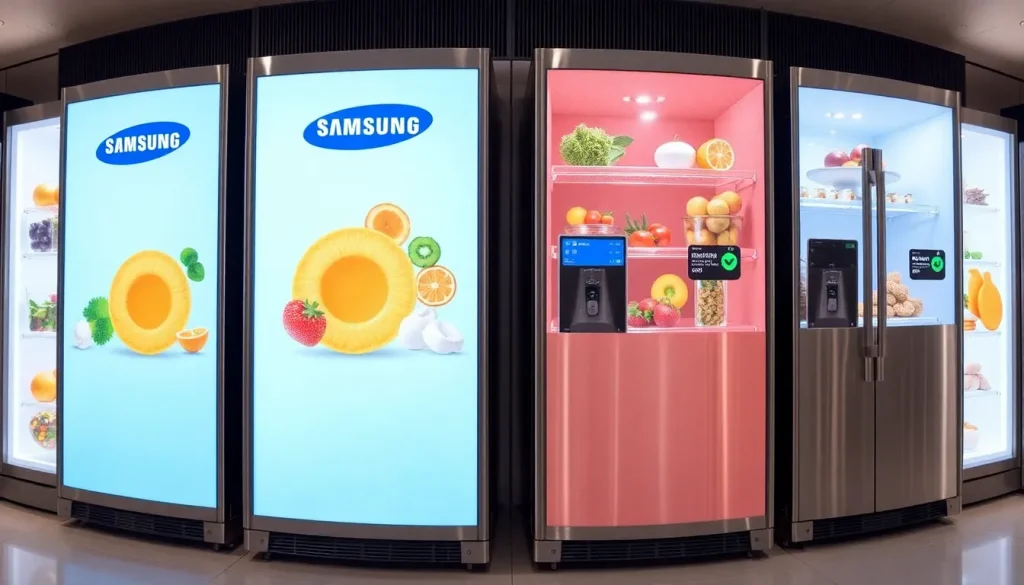Samsung to display ads on its premium refrigerators

In an era where technology permeates every aspect of our lives, the concept of a smart home has quickly evolved from a futuristic dream to a mainstream reality. However, as companies like Samsung push the boundaries of innovation, some consumers are beginning to question the implications of integrating advertising into their everyday appliances. This discussion takes a new turn as Samsung announces the inclusion of ads on their high-end Family Hub refrigerators, raising eyebrows among tech enthusiasts and average consumers alike.
The idea of embedding advertisements within household devices is not entirely new. Manufacturers such as LG and Roku have experimented with similar concepts, aiming to monetize user engagement in ways that many find intrusive. As smart technology continues to advance, the lines between convenience and commercialism are becoming increasingly blurred.
Samsung's strategy to integrate ads into Family Hub refrigerators
Samsung's Family Hub series stands out due to its advanced features, including a built-in display, voice control via Alexa, and seamless integration with various smart home devices. Priced at approximately €3,400 in Spain, these refrigerators are marketed as the epitome of kitchen convenience. However, a recent firmware update has sparked controversy by introducing advertisements on these devices.
A user on Reddit shared a screenshot indicating the presence of ads in the fridge's interface following an update. This update explicitly mentions that advertisements will appear on the Cover Screen for specific themes such as Weather, Color, and Daily Board, while the Art and Gallery themes will remain ad-free.
Understanding the implications of advertising on smart appliances
The inclusion of ads on smart appliances raises several questions regarding user experience and privacy. Samsung has confirmed that this initiative is part of a pilot program, with ads set to appear on certain screens of the Family Hub refrigerators. Notably, these ads will only be implemented in the United States initially.
According to Samsung, the ads can be dismissed from the screens, and they will not reappear during the pilot phase. This approach is intended to gauge consumer reactions and assess the potential for broader implementation in the future. However, the lack of clarity regarding the rollout in other countries has left many consumers uneasy.
- What happens to user experience when ads invade personal spaces?
- Will the revenue generated from these ads justify the invasion of privacy?
- How will consumers react to ads on devices they have invested heavily in?
Consumer reactions to Samsung's ad initiative
Feedback from users has been mixed. Some consumers believe that the minimal revenue generated from ads will not compensate for the potential backlash. Critics argue that smart appliances should enhance convenience, not introduce unwanted commercial interruptions. Many users express concerns that this could lead to a slippery slope, where more devices begin to feature ads as part of their functionality.
Interestingly, some have reported seeing ads on other Samsung devices as well. For instance, a user noted that advertisements appeared on the home screen of their OLED S95 television, suggesting that this could become a broader trend across Samsung's product line.
Potential expansion of advertising across devices
The initiative to display ads on refrigerators is not an isolated case within Samsung. There is a considerable potential for this model to expand across various smart devices, including:
- Smart TVs
- Smart speakers
- Washing machines with displays
- Smart mirrors
This strategy could open new revenue streams for manufacturers, but it also raises ethical considerations. As consumers become increasingly accustomed to ad-free experiences in their personal lives, the introduction of ads in previously ad-free environments may lead to significant pushback.
Looking ahead: The future of smart appliances and advertising
As we move forward, the question remains: how will consumers react to this new advertising model in their homes? The intersection of technology and advertising will likely continue to evolve, with companies exploring new ways to monetize consumer interactions. While some may see value in receiving tailored content through their smart appliances, others may view this as an unwelcome intrusion.
The success of Samsung's pilot program could pave the way for similar initiatives across the industry, potentially transforming how we perceive our appliances. As the market adapts, manufacturers will need to balance innovation with consumer satisfaction to maintain trust and loyalty.
To delve deeper into Samsung's smart refrigerator features, check out this insightful video:
Ultimately, the consumer's experience with these ads will determine their acceptance. If Samsung and other manufacturers can successfully integrate advertising while maintaining the integrity of user experience, they may find a lucrative balance between innovation and commercialization. However, if backlash continues, they will need to rethink their strategies in the rapidly evolving landscape of smart technology.




Leave a Reply